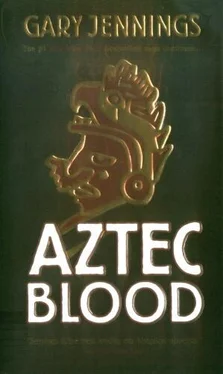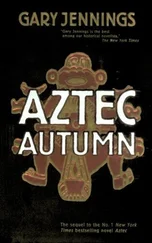Gary Jennings - Aztec Blood
Здесь есть возможность читать онлайн «Gary Jennings - Aztec Blood» весь текст электронной книги совершенно бесплатно (целиком полную версию без сокращений). В некоторых случаях можно слушать аудио, скачать через торрент в формате fb2 и присутствует краткое содержание. Жанр: Старинная литература, на английском языке. Описание произведения, (предисловие) а так же отзывы посетителей доступны на портале библиотеки ЛибКат.
- Название:Aztec Blood
- Автор:
- Жанр:
- Год:неизвестен
- ISBN:нет данных
- Рейтинг книги:4 / 5. Голосов: 1
-
Избранное:Добавить в избранное
- Отзывы:
-
Ваша оценка:
- 80
- 1
- 2
- 3
- 4
- 5
Aztec Blood: краткое содержание, описание и аннотация
Предлагаем к чтению аннотацию, описание, краткое содержание или предисловие (зависит от того, что написал сам автор книги «Aztec Blood»). Если вы не нашли необходимую информацию о книге — напишите в комментариях, мы постараемся отыскать её.
Aztec Blood — читать онлайн бесплатно полную книгу (весь текст) целиком
Ниже представлен текст книги, разбитый по страницам. Система сохранения места последней прочитанной страницы, позволяет с удобством читать онлайн бесплатно книгу «Aztec Blood», без необходимости каждый раз заново искать на чём Вы остановились. Поставьте закладку, и сможете в любой момент перейти на страницу, на которой закончили чтение.
Интервал:
Закладка:
Even poor léperos knew fragments of it. The poem recalls the Cid's life and triumphs. A Castilian knight who lived over four hundred years ago, his deeds were deified throughout both Spain and New Spain, as if that very morning he'd beat back the Moorish hordes. In an age of chaos, when Spain was rent by feuding Christian kings and petty Moorish states, when war was continuous and peace a madman's dream, the Cid—also called El Campeador, the Champion—was the Perfect Knight Exemplar, who never lost a battle.
While Hernan Cortes was everywhere revered for sacking New Spain and slaying my ancestors by the millions with a ragtag band of barely five hundred men, even El Hernando paled before El Cid. The Champion was no mere man, but a mortal god.
The dwarf dropped from the barrel, and the rogue called Mateo leaped atop it. Whirling his cape with almost preternatural aplomb, he addressed the crowd.
"There is none among you whose veins do not burn with the blood of Spain, whose hearts do not thunder like barbary steeds, when told how the Cid—betrayed by enemies at every turn—was banished forever from hearth and Crown."
A murmur of assent arose from the audience even though many were of mixed blood. I was less entranced than most. I too knew the poem—and his entire history—by heart. His name was actually Rodrigo Díaz de Vivar. Mio Cid was a Spanish-Arabic derivation of "My Lord," in honor of his noble birth and accomplishments. He was banished from court because of jealousy: He defeated a Moorish army without the king's authorization and then invaded Moorish Toledo. Neither his august family nor the king's niece, his wife, could save him.
"The poema de mio Cid begins with the champion's exile, exiting the shattered gates of his castle in compliance with the king's orders. Sixty men follow him."
Mateo performed the poem in the declamatory style, depicting betrayal and exile in starkly powerful cadences:
He turns to see the ruined hold, the tears fall thick and fast,
The empty chests, the broken gates, all open to the blast,
Without raiment are the wardrobes, reft of mantle and of vair,
The empty hollow of the hall of tapestry is bare.
No feather in the falconry, no hawk to come to hand,
A noble beggar must the Cid renounce his father's land.
Mateo paused as the dwarf and the actors around the barrel fanned out, their hats held out for contributions from the crowd. Mateo noisily cleared his throat. "It's parched and needs to be wetted if I am to persevere."
When enough money had flowed into the hats to buy whatever would wet the actor's voice, he continued, describing how the flight of a Raven was an ominous sign that they were exiles. His life was in a wreck from the lies and deceit of others, but someday he would have his revenge.
Mateo was handed a large goblet of wine. He took a long drink, tilting back his head as the sword swallower had done. He did not stop till he was sucking air, and when he upended the goblet it was empty.
"More wine for the 'Poema del Cid,' " the dwarf shouted, as he and the others of the troupe waded into the crowd with their hats.
Mateo drew his sword and gestured dramatically with it as he recited the poem.
The sixty lances of the Cid rode clattering through the town;
From casement and from turret top the townfolk look down.
Sad were their hearts and salt in their eyes as Rodrigo rode by;
"There goes a worthy vassal who has known bad mastery."
And many a roof that night had sheltered Rodrigo and his band
But for the dread in Burgos of the king's heavy hand.
The missive broad with kingly seals had run throughout the town;
"Who aid the Cid in banishment, his house shall be cast down."
I listened while the Cid and his small band slew Moors, sacked cities, and slaughtered Christian traitors. In a tumultuous battle with the count of Barcelona, who opposed him with Christian knights and a Moorish host, El Cid won the Kingdom of Valencia.
Mateo recounted how the Cid spurred his mighty war horse, Babieca, against the dreaded Moorish horde of King Bucar:
The good blade shears the Moor in twain, down to the saddlebow;
So perish the Algerian lord—may every Moor die so!
The Cid had won the great sword Colada in battle with the Moors and then, in the battle against King Bucar, he added a second great sword, Tizon.
While listening to the poet master's impassioned tones, I chanced to study a balcony overlooking the plaza. A group of notables, doñas and caballeros, were on the balcony of the building next to where Mateo was giving his performance. An old woman in black was among them, staring down.
My blood ran cold.
I felt what King Bucar must have felt when the sharp blade of Colada sliced him down the middle.
I melted back into the crowd, risking only a shy, over-the-shoulder glance. Her eyes were locked on Mateo as he recounted the end of the poem.
So in Navarre and Aragon his daughters both did reign,
And princes of his blood today sit on the thrones of Spain.
Greater and greater grew his name in honor and in worth;
Until at last at Pentecost he passed away from earth.
Upon him be the grace of Christ, Whom all of us adore.
Such is the story, gentles, of the Cid Campeador.
Darkness was falling. I gave up my search for the fray. Fleeing the plaza, planning to return to the House of the Poor, I did not think the old woman had spotted me in the crowd. From the balcony I was just one more straw hat in a sea of such hats, but her mere presence in the plaza felt like a garrote strangling me.
What if I was being followed? Glancing over my shoulder, I veered from the hospice, sticking to the side streets. Hiding under cover of night, I was angry and frightened. What had I done to this doña? In my brief years on Veracruz's cruel streets I had suffered many adversities, but a gachupín dowager's blood vengeance was not one of them.
My only hope was Fray Antonio. Although criollo born, he was of pure Spanish blood. Compared to léperos such as myself, he was a king.
Life in the House of the Poor had moments of excitement. One never knew what to expect from street people. Three weeks before the archbishop's arrival, I arrived home after dark and heard laughter from inside. There I found Fray Antonio with a prostitute and her pimp lover. The woman lay on the table. Her left leg was black and swollen. They were plying her with pulque in hopes that she might pass out.
"She cut her foot weeks ago and the poison has spread," Fray Antonio said. "If I don't cut it off, she will die."
The woman did not have the money for the local surgeon barber who normally performed bleedings and medical amputations when he wasn't cutting hair. Fray Antonio, however, was not without medical skill. The street people preferred the skills and medicaments of our indio healers but did allow that Fray Antonio's powers surpassed those of most Spanish doctors. In any event Fray Antonio was now her last best hope.
The woman was drunk, snoring, flat on her back, and they were about to amputate her leg. The fray had a saw, an iron blade, and a pot of boiling oil heating on the coals. After they sawed off the leg, he would cauterize many of the veins with a hot blade. The raw stump he would char with boiling oil.
The fray tied her arms and legs, torso and neck to the table. He placed a thick wood stick between her teeth, and tied it tight behind her head. All the while her lover trembled convulsively, his face green as a jalapeño.
When the fray began to saw, the puta's screams rang through the night like screams of the damned. Blood detonated, and the man fled the hospice in terror.
Читать дальшеИнтервал:
Закладка:
Похожие книги на «Aztec Blood»
Представляем Вашему вниманию похожие книги на «Aztec Blood» списком для выбора. Мы отобрали схожую по названию и смыслу литературу в надежде предоставить читателям больше вариантов отыскать новые, интересные, ещё непрочитанные произведения.
Обсуждение, отзывы о книге «Aztec Blood» и просто собственные мнения читателей. Оставьте ваши комментарии, напишите, что Вы думаете о произведении, его смысле или главных героях. Укажите что конкретно понравилось, а что нет, и почему Вы так считаете.











